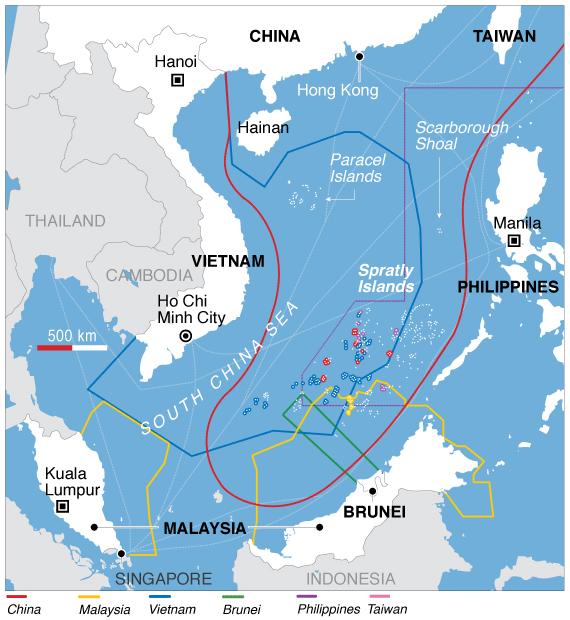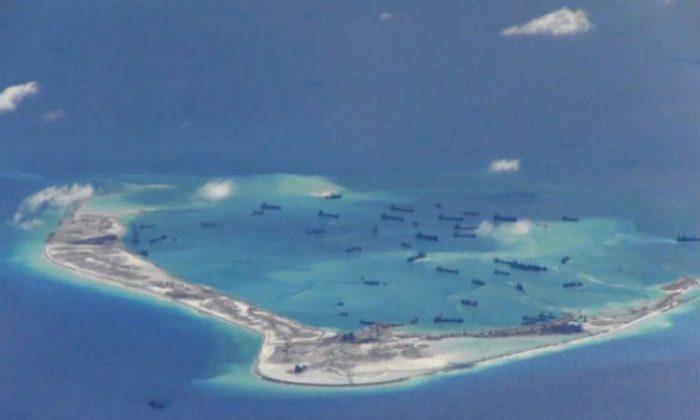The foundation of the Chinese regime’s legal case and strategy for exploiting the South China Sea rested on a supposed historical ownership—and on July 12, an arbitration court in The Hague declared that this foundation is false.
The Chinese Communist Party (CCP) quickly shot back. A statement from its Foreign Ministry says it views the tribunal’s decision as “null and void and has no binding force,” and says it “neither accepts nor recognizes it.”
In spite of the bluster issuing from Beijing, the CCP has lost its main line for propaganda and its best chance to establish a moral ground for its position on the South China Sea.
A Battle of Deception

One of the main strategies the CCP has employed in the South China Sea is what it calls the “Three Warfares.” These are legal warfare, psychological warfare, and media warfare.
Cheng said that the CCP’s use of legal warfare “was not really a matter of what other legal authorities say.” He noted that already there are Chinese law professors and others trying to discredit the tribunal, and saying it has been tainted or has no authority.
At its heart, the CCP’s Three Warfares is a strategy for disinformation—a form of propaganda that functions by manufacturing a lie with a grain of truth and then using this lie as a foundation to make seemingly legitimate arguments. A key goal of disinformation is to get coverage in otherwise credible news outlets and think tanks, which can then be used to make additional arguments.
The Road Ahead
The tribunal’s website went offline shortly after the announcement, but an archive of its press release is still available.According to the press release, the CCP boycotted the tribunal, but even in China’s absence, the tribunal took steps to “test the accuracy of the Philippines’ claims,” it states. This included questioning the Philippines, appointing independent experts to “report to the tribunal on technical matters,” and “obtaining historical evidence concerning features in the South China Sea and providing it to the parties for comment.”
In the end, the tribunal overwhelmingly found the CCP’s claims to be false. It said in the press release, it “found that China’s claim to historic rights to resources was incompatible with the detailed allocation of rights and maritime zones” in the United Nations Convention on the Law of the Sea, and that any historic rights the CCP had to resources in the South China Sea were “extinguished by the entry into force of the Convention to the extent they were incompatible with the Convention’s system of maritime zones.”

Regardless of the decision, however, the CCP has repeatedly stated it would “neither accept nor participate in the arbitration unilaterally initiated by the Philippines,” according to the press release.
According to Cheng, the Chinese regime did not attend the hearings for the simple reason that “they knew their case was not going to stand up to current tenets of international law.” But, according to Cheng, “the Chinese were not going to make any concessions in the South China Sea before this, and they’re not going to now.”
He added that “there weren’t many countries that believed the Chinese position to begin with.”
Moving forward, it’s likely the CCP will make a new propaganda push to discredit the tribunal, and it may try to manufacture a new disinformation line to base its claims on. It’s also likely the CCP will make a stronger push either with military strength or by starting more civilian ventures in the South China Sea.
The CCP has four masks it can wear in the South China Sea conflict: one for military intimidation, one for peaceful civilian ventures, one for financial gain, and another for strategic deception.
The ruling has put a dent in the CCP’s mask for strategic deception, but its other fronts remain largely unscathed.
“I think the Chinese are going to play the tourist card,” Cheng said, noting that already it has done tourist flights to the South China Sea. He said the CCP will also likely make new pushes with military power and may look for an economic component as well in order to justify its unlawful ventures in the region.
He noted that the CCP may also try a diplomatic approach, and build its own alliance, which could include Laos, Cambodia, and Brunei. He said it may offer these countries an agreement “to say, work with us you get something, oppose us you'll get nothing.”





